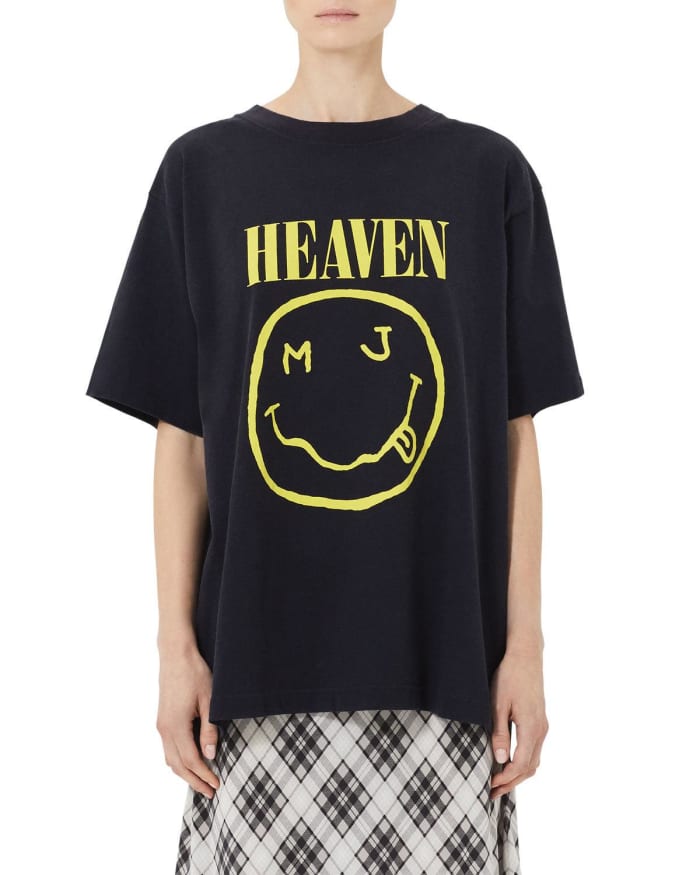
Marc Jacobs Bootleg Redux Grunge T-Shirt. Photo: Neiman Marcus
Nirvana sues Marc Jacobs for copying its smiley face logo
Nirvana is suing Marc Jacobs for using its trademarked smiley face logo on a T-shirt in the brand’s recently relaunched “Grunge” collection. The late Kurt Cobain created the iconic logo in 1991, and “Nirvana has used that copyright-protected design and logo continuously since [then] to identify its music.” According to the complaint, the brand did not receive authorization or pay a license fee to use Nirvana’s intellectual property on its $115 tees and $200 crewneck sweatshirts. The band is therefore demanding that Marc Jacobs, as well as stockists Neiman Marcus and Saks Fifth Avenue, immediately stop marketing and selling the allegedly infringing wares. {The Fashion Law}
10 trends that will set the 2019 global fashion agenda
Business of Fashion teamed up with McKinsey & Company to highlight the 10 trends that will define the global fashion industry in 2019. Their findings suggest that this year will be shaped by “consumer shifts linked to technology, social causes and trust issues, alongside the potential disruption from geopolitical and macroeconomic events.” It will be a year of ample opportunities, but one that will present numerous risks: “Only those brands that accurately reflect the zeitgeist or have the courage to ‘self-disrupt’ will emerge as winners.” {Business of Fashion}
Vans files lawsuit against Primark for selling copies of its skateboard sneakers
Vans and its parent company VF Corp have filed a lawsuit against Primark for allegedly copying the designs of two sneaker styles: the Vans Old Skool sneaker, featuring the iconic side stripe, and the Vans Sk8-Hi sneaker, a lace-up high top also with the classic stripe. The footwear brand claims the retailer has been selling “copies” of its skateboard sneakers since 2017. ”The infringing products are calculated and intentional knock-offs of Vans’ footwear products and have been designed to confuse the purchasing public,” the company said in court documents. As of now, Primark disagrees with the allegations and plans to defend its position. {Independent}
Lady Gaga quietly launched a Haus Beauty website
Earlier this year, we discovered that Lady Gaga‘s company Ate My Heart, Inc. applied for a trademark for a brand called Haus Beauty. But since then, we’ve been too distracted by her performance in “A Star Is Born” to think up what products Gaga would bring to the crowded cosmetics space. Fortunately, the singer reminded us of her entry into the beauty industry on Monday with the quiet launch of the Haus Beauty website, which as of now, just contains an email sign-up. {Hypebae}
“Pooey Puitton” toy purse maker sues Louis Vuitton
MGA Entertainment Inc, a California-based manufacturer of children’s toys, filed a preemptive suit against Louis Vuitton to prevent the French luxury goods maker from interfering with its sales of a slime-filled, poop-shaped toy purse for children, Pooey Puitton. In a complaint filed on Friday in Los Angeles federal court, MGA Entertainment Inc said no reasonable consumer would mistake Pooey Puitton, which retails for $59.99, for costlier Louis Vuitton handbags. {Business of Fashion}
Smart apparel is poised to grow in 2019
2019 will be a big year for wearable tech: Juniper Research expects major growth in connected clothing (102 percent), smart glasses (98 percent), smart jewelry (55 percent), hearables (31 percent) and smartwatches (31 percent). With smart apparel topping the list, 2019 will be the year that more brands join companies like Google and Levi’s and develop technology for smart clothes. {WWD}
Holiday fashion ads missed the mark
Fast-fashion retailers and luxury brands alike struggled to connect with customers this holiday season. According to the Advertising Benchmark Index, brands used dreamy and more abstract marketing, which was lost on a general audience. Sadly, Asos — which did a spoof of the Keira Knightly cue cards scene in ”Love Actually” — Gucci, Fashion Nova and H&M were among the brands with underperforming holiday campaigns. {WWD}
Source: Fashionista
